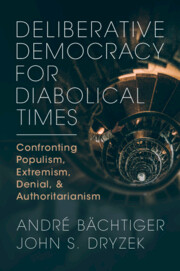 Deliberative Democracy for Diabolical Times
Deliberative Democracy for Diabolical Times Book contents
- Deliberative Democracy for Diabolical Times
- Deliberative Democracy for Diabolical Times
- Copyright page
- Contents
- Preface
- 1 An Introduction for Diabolical Times
- 2 Deliberation for Realists and Skeptics
- 3 Democracy in a Diabolical Soundscape
- 4 How to Deliberate with (and against) Populists
- 5 How to Deliberate with (and against) Extremists
- 6 How to Deliberate with (and against) Deniers
- 7 How to Deliberate with (and against) Authoritarians
- 8 How to Deliberate with Everybody
- 9 How to Renew a Deliberative Democracy
- References
- Index
8 - How to Deliberate with Everybody
Published online by Cambridge University Press: 28 March 2024
- Deliberative Democracy for Diabolical Times
- Deliberative Democracy for Diabolical Times
- Copyright page
- Contents
- Preface
- 1 An Introduction for Diabolical Times
- 2 Deliberation for Realists and Skeptics
- 3 Democracy in a Diabolical Soundscape
- 4 How to Deliberate with (and against) Populists
- 5 How to Deliberate with (and against) Extremists
- 6 How to Deliberate with (and against) Deniers
- 7 How to Deliberate with (and against) Authoritarians
- 8 How to Deliberate with Everybody
- 9 How to Renew a Deliberative Democracy
- References
- Index
Summary
Most people in most societies do not fall into the four problematic categories of populists, extremists, deniers, and authoritarians. It is important to consider deliberation involving everybody else in these diabolical times. We could then get a deliberative democracy and a citizenry that are robust in the face of the threats to democracy and that can join in with deliberation against these threats. Equally important in light of the specific concerns we have raised in the previous four chapters, truly inclusive and effective public deliberation should reduce the proportion of people who, out of despair at the democratic alternatives, find themselves attracted to the four problematic positions. This includes allegiant citizens satisfied with existing democratic institutions, dissatisfied citizens, and critical citizens who want to participate more. We then turn to categories of people whose voice ought to be facilitated more effectively in public deliberation, including the working class, women, and marginalized cultural groups. Different deliberative forms are likely to attract different kinds of citizens, which suggests a variety of differentiated practices ranging from contestatory deliberation to more constructive and respectful deliberation oriented to the common good, all of which can join active resistance to anti-democratic transgressions and contribute to democratic renewal.
Keywords
- Type
- Chapter
- Information
- Deliberative Democracy for Diabolical TimesConfronting Populism, Extremism, Denial, and Authoritarianism, pp. 168 - 185Publisher: Cambridge University PressPrint publication year: 2024
